- News
- Reviews
- Bikes
- Components
- Bar tape & grips
- Bottom brackets
- Brake & gear cables
- Brake & STI levers
- Brake pads & spares
- Brakes
- Cassettes & freewheels
- Chains
- Chainsets & chainrings
- Derailleurs - front
- Derailleurs - rear
- Forks
- Gear levers & shifters
- Groupsets
- Handlebars & extensions
- Headsets
- Hubs
- Inner tubes
- Pedals
- Quick releases & skewers
- Saddles
- Seatposts
- Stems
- Wheels
- Tyres
- Tubeless valves
- Accessories
- Accessories - misc
- Computer mounts
- Bags
- Bar ends
- Bike bags & cases
- Bottle cages
- Bottles
- Cameras
- Car racks
- Child seats
- Computers
- Glasses
- GPS units
- Helmets
- Lights - front
- Lights - rear
- Lights - sets
- Locks
- Mirrors
- Mudguards
- Racks
- Pumps & CO2 inflators
- Puncture kits
- Reflectives
- Smart watches
- Stands and racks
- Trailers
- Clothing
- Health, fitness and nutrition
- Tools and workshop
- Miscellaneous
- Buyers Guides
- Features
- Forum
- Recommends
- Podcast
news
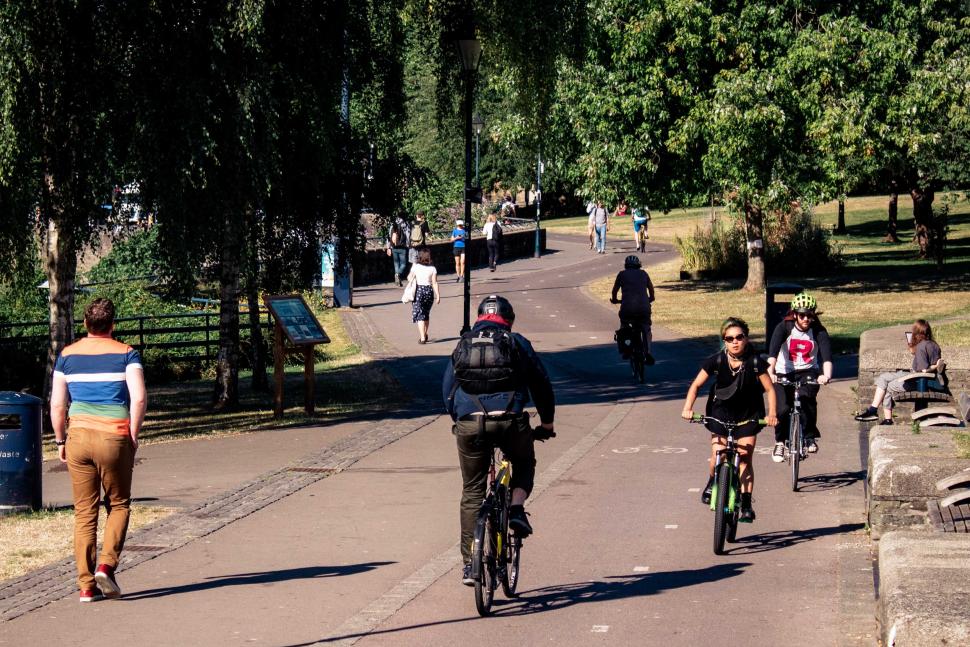 Cyclists and pedestrians in Castle Park, Bristol (image: Adwitiya Pal)
Cyclists and pedestrians in Castle Park, Bristol (image: Adwitiya Pal)Seven out of ten people say they never ride a bike, as safer roads – not more cycle lanes – viewed as key to encouraging cycling, new national travel study finds
Seven out of ten people never ride a bicycle, a new government survey on attitudes towards travel has found, which also revealed that safer roads – rather than the introduction of new cycling-specific infrastructure – would encourage more people to cycle on a regular basis.
According to the National Travel Attitudes Study (NTAS), which collected responses from 2,011 individuals aged 16 and over in England and was published yesterday by the government, general safety concerns were also cited as the primary reason for discouraging cycling, along with poor weather and travel distances.
However, when asked if they would be more likely to cycle, or cycle more, if new bike lanes were introduced in their area, only 29 per cent of respondents claimed that building new infrastructure would make them more likely to ride a bike, compared to 44 per cent who reckoned such an outcome would be unlikely (while 11 per cent, notably, believe that their area already has enough cycle lanes).
Middle aged, middle class, and middle of the road?
When it comes to discerning what kind of person actually rides a bike, the National Travel Attitudes Survey unfortunately won’t do much to dispel the tabloid-fuelled notion that a large proportion of cyclists are well-off MAMILs.
Of the survey’s 2,011 respondents, 39 per cent of people aged 16 and over own a bicycle or have access to one, a figure comparable to the 2022 Walking and Cycling statistics release which found that 43 per cent of people aged five or over are able to jump on a bike.
Drilling down into the demographics of those who own a bike, the results echo socialist Eamonn McCann’s denunciation of nationalist reformers in 1960s Northern Ireland (a famous quote alluded to in the above subtitle and not, of course, a reference to road positioning), with cyclists more likely to be located firmly in the middle-class and middle-aged classifications.
According to the survey, 48 per cent of respondents aged 40 to 59 have regular use of a bicycle, compared to 43 per cent of those aged 16 to 39, 39 per cent of those in their 60s, and 16 per cent of anyone aged 70 or older.
The stereotype appears even harsher when assessing household income. In households where the average annual income is less than £15,000, only 25 per cent of people have access to a bike. This figure rises to 35 per cent for those earning a household income of £15,000 to £35,000, before jumping to 48 and 50 per cent for those earning £35,000 to £50,000 and £50,000 or more, respectively.
How often do people cycle?
With only 39 per cent of respondents having access to a bicycle, it’s perhaps no surprise that 70 per cent say that in an average week they never travel by bike. On the other hand, 18 per cent say they cycle for travel at least once a month, with just seven per cent revealing that they have never experienced the joy of riding a bike.
93 per cent, meanwhile, say they have never used an e-bike rental scheme, though two per cent of respondents say they avail of hire bike initiatives at least once a month.
When asked how confident they feel when riding a bike, 56 per cent said they were either fairly or totally confident, compared to 36 per cent who said they were not very or not at all confident when riding a bike (with those who lack confidence jumping dramatically over the age of 70).
So what factors help encourage or discourage cycling?
While the introduction of cycling infrastructure and bike lanes has become a central part of the active travel agenda over the past decade, it’s perhaps noticeable that, at least in the government’s latest survey, cycle lanes aren’t viewed as a panacea for getting more people to ride bikes.
According to the study, only 29 per cent said that they would be likely to cycle, or cycle more, if more bike lanes were introduced in their area. This number was slightly higher in urban areas, though 42 per cent of town and city dwellers said they would be unlikely to take up cycling thanks to the presence of new bike lanes. 12 per cent of respondents also believe that their town or city “already has enough cycle lanes”.
In rural areas, perhaps unsurprisingly, the percentage of those who wouldn’t be swayed by fresh new infrastructure is 53 per cent.
The survey’s findings on cycle lanes, incidentally, echo the recent work of Malmö University researcher Zahra Hamidi, whose study on attitudes towards cycling suggested that building more cycle lanes is just one part of the equation to get more people cycling, but it is not sufficient on its own to achieve that goal.
Meanwhile, safer roads were instead cited as the factor that would encourage the largest proportion of people to cycle, or cycle more, with 61 per cent of respondents choosing this option (including roughly two thirds of those aged between 16 and 59).
Other factors, such as a clear gender dynamic, come into play when assessing the factors that would most encourage cycling. 57 per cent of men were inclined to agree that well-maintained road surfaces would be an encouragement, compared to 47 per cent of females who thought the same.
The roles, however, were reversed when it came to assessing the impact of cycle training for teaching both the fundamentals of riding a bike and boosting confidence, with 17 per cent of women agreeing that training would encourage them to cycle more, compared to 10 per cent of males.
When considering just those who cycle at least annually, women are more likely to be encouraged by the presence of off-road and protected cycle paths and lanes (76 per cent compared to 63 per cent of men surveyed), along with safer roads in general (78 per cent compared to 69 per cent).
Those findings support the recent study conducted by the London Cycling Campaign’s Women’s Network, which found that 93 per cent of women have experienced dangerous and intimidatory driving while cycling, and that 88 per cent of women say they prefer cycling on protected cycle lanes or on low traffic routes, and that they rely on them for their journeys, refusing to ride their bike without them.
People from ethnic minority backgrounds, meanwhile – who despite being more likely to cycle “at least annually” make fewer cycle trips than their white counterparts – responded more favourably to every kind of encouragement to cycle than respondents on the whole, with 74 per cent agreeing that safer roads were key to encouraging cycling.
Individuals from white backgrounds were also notably much less likely to be encouraged by cycling training, better bike hire facilities, and the opportunity to buy or hire cheaper bicycles than those from ethnic minority backgrounds.
Finally, when asked what reasons they gave for choosing not to ride a bike, or for not cycling more, 48 per cent of respondents said they were concerned about safety (with 51 per cent of females citing safety concerns, compared to 45 per cent of males).
29 per cent of females also said they didn’t feel confident enough in their cycling skills (compared to just 12 per cent of men), while 32 per cent of women surveyed – and 28 per cent overall – said having children, passengers, or too much to carry prevented them from cycling regularly.
36 per cent also said that poor weather stopped them from riding a bike, while a third of respondents claimed to live too far away “from where I need to get to” to cycle. 35 per cent of those aged over 70 also noted a health condition that prevents them from cycling, while 27 per cent of the same demographic concluded that “cycling is not for people like me”, a view shared by 12 per cent of the survey’s 2,000-odd respondents.
After obtaining a PhD, lecturing, and hosting a history podcast at Queen’s University Belfast, Ryan joined road.cc in December 2021 and since then has kept the site’s readers and listeners informed and enthralled (well at least occasionally) on news, the live blog, and the road.cc Podcast. After boarding a wrong bus at the world championships and ruining a good pair of jeans at the cyclocross, he now serves as road.cc’s senior news writer. Before his foray into cycling journalism, he wallowed in the equally pitiless world of academia, where he wrote a book about Victorian politics and droned on about cycling and bikes to classes of bored students (while taking every chance he could get to talk about cycling in print or on the radio). He can be found riding his bike very slowly around the narrow, scenic country lanes of Co. Down.
Latest Comments
- Rome73 1 sec ago
'A bit concerned about the woman who drives 2 1/2 hours and then catches a plane'...
- hawkinspeter 5 hours 47 min ago
Yul Brynner was a lifelong liverpool fan who didn't wear aftershave <singing> Yul never wore cologne </singing>
- dh700 6 hours 44 min ago
Unfortunately for you, you previously claimed, back on page 1, "Average distance ridden by American cyclists per year, less than 50km." Per...
- mark1a 7 hours 45 min ago
They almost certainly will; back in 2022, here in Dorset, we were due to host stage 7 of the Tour of Britain, and for the months preceding, the...
- mdavidford 8 hours 51 sec ago
The way back ones don't count - he said 'in the last 20 years' (presumably the cycling equivalent of 'in the Premier League era') so it's only 2007...
- whosatthewheel 8 hours 25 min ago
Only mugs buy anything for the full retail price these days. They will soon be reduced to 299, just like the 1st gen. which went from 375 to 199 in...
- Bmblbzzz 9 hours 26 min ago
How is it only an extra 56 minutes a day? That seems to imply either the road is very busy with vehicles, in which case it might not be delivering...
- KiwiMike 9 hours 36 min ago
I've lived in Perthshire for seven years. You really should stay abreast of NZ politics - believe me, Scotland is a beacon of properiety in...
- Rendel Harris 10 hours 3 min ago
"Gloucestershire Live" headline on Facebook...you actually have to open the story to discover a car was involved and he didn't just misjudge a bend...
- leedorney 10 hours 32 min ago
Next min we'll be hearing he's related to Ursula Von Der layen
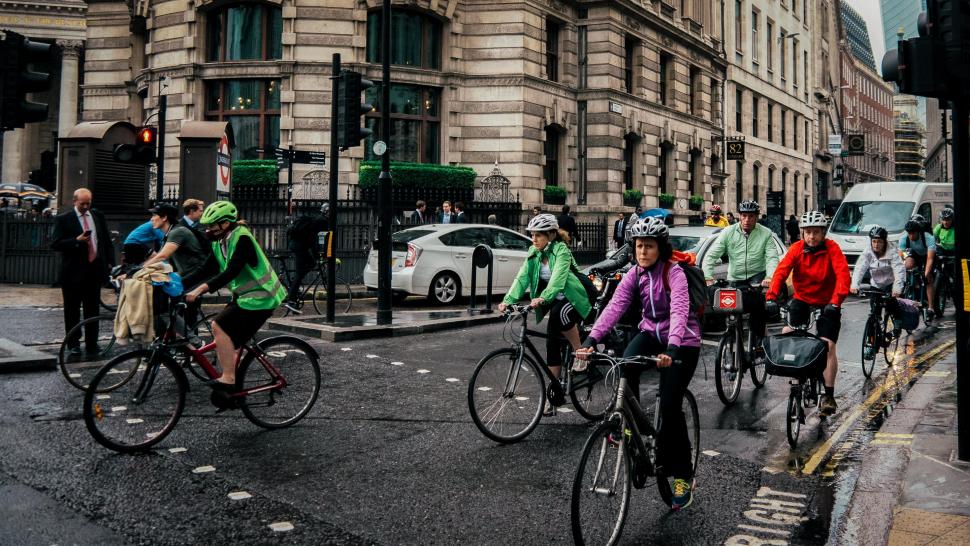

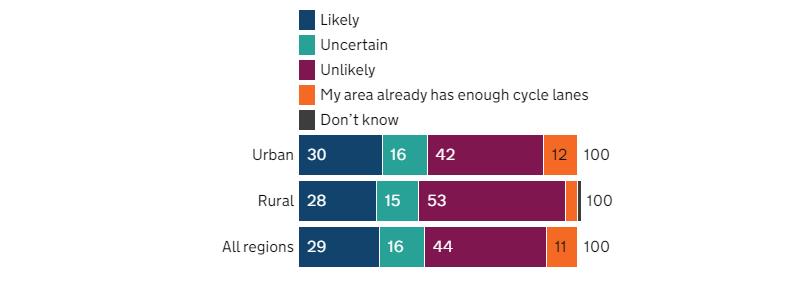
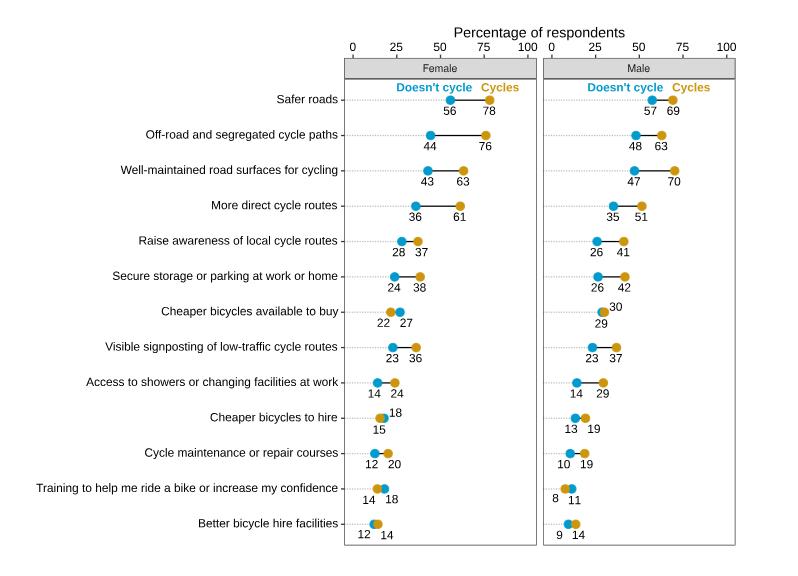
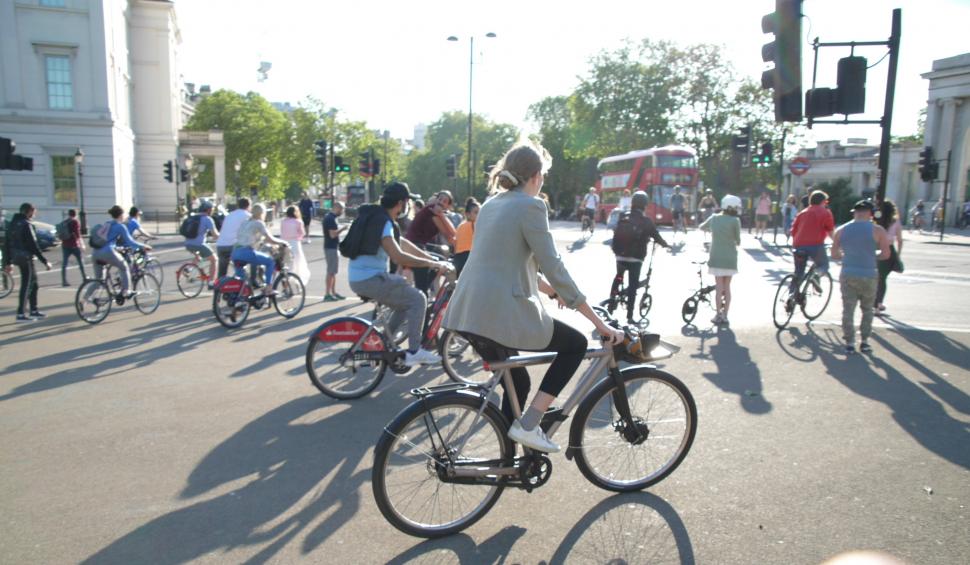
Add new comment
28 comments
I own multiple bikes but only use them for recreation. When I worked for an employer who provided secure cycle parking I commuted 40 miles 2 or 3 days a week. Until bike theft is addressed I can't see cycling as a viable transport option.
The survey seems to ignore one of the main obstacles to getting on a bike might be BMI and general levels of fitness and the desire / means to change this. They then drill down into the classes whilst ignoring what the government already know....this from Anna Soubry over 10years ago. https://www.independent.co.uk/life-style/health-and-families/health-news...
I'm sure you'd find people in the UK *saying* "I'm not sporty enough to cycle" -. And in the UK the road environment - and some cyclists - exert psychological pressure to be one of the fit.
OTOH cycling is less effort than walking (why you tend to find people with leg issues on wheels rather than crawling along with their arms)! And where cycling is normal you see the normal proportions of "sporty" and "normal" people:
https://www.aviewfromthecyclepath.com/2011/02/who-cycles-in-netherlands....
https://bicycledutch.wordpress.com/2015/01/02/what-defines-dutch-cycling-2/
So in short: it may be a *perceived* obstacle in the UK. You could say "well eg. the perception that the roads are not safe is also just ... a perception as they are, statistically". I'd say that's more significant for people - some people's fear of death is activated regularly, if not constantly, cycling on some UK roads. And it's just not pleasant to cycle in traffic at all. Plus roads are now designed for *motor vehicles* eg. lots of traffic lights - inconvenient and unnecessary where there are just vulnerable road users in a space.
As I got in to cycling because of type 2 diabetes I wold argue that it was fear of dying prematurely that got me in to cycling. Deaths caused by obesity and conditions like diabetes far outnumber those on our roads. I'm not suggesting that that more cycling infra is a bad thing only that they have ignored other factors, perceived or otherwise, that hold back cycling.
Me too - cycling is the only form of exercise I enjoy and have managed to stick at for over 10 years as an adult. It's been great for keeping weight and blood sugar levels under control. I didn't go straight onto a road bike, I rode a hybrid for a 6 months "apprenticeship" until the kgs started falling away, before buying a drop bar bike, that's how I got round the thoughts of "I'm not sporty or fast enough for this."
Haven't looked back since, it's been life-changing both physically and mentally. Highlights since have been Paris-Roubaix, Alpe d'Huez, Passo dello Stelvio, Portugal N2 (5 days), multiple RideLondons and dipped my toe into a few 200km audaxes. All of this would have seemed impossible until that day I walked into Primera Sports and said I wanted to buy a bike.
Glad to hear!
I'm a little confused though - you seem to say that you think a reason people don't cycle is lack of fitness / health issues, but then cite that as why *you* took up cycling?
TBH given that most people in the UK don't cycle and certainly don't regard cycling as a sensible mode of transport I'd be skeptical of some of the reasons anyway. If someone asked me the reasons eg. I wasn't playing the organ (I don't) and then either gave me a multiple choice or "categorised" my answer I doubt my responses would inform. I'd have just "put something down" - the question not naturally occurring to me and not being of great relevance. (eg. I have no desire to learn this skill and if promoted probably don't believe I could).
That probably applies to many choices we make unconsciously / don't appear to be choices. "Why did you drive here today?" - "well I felt 30 miles was a bit far to walk in the rain, the space hopper was flat and I couldn't find my rollerskates."
The British Medical Association says that the health benefits of cycling outweigh the risks by a factor of 20:1. Good on you for improving your health. A buddy of mine has done the same for the same reason and seen the benefit.
Of course it's not so much that the Dutch can cycle because they're healthy, the causation runs the other way.
https://www.ncbi.nlm.nih.gov/pmc/articles/PMC4504332/
Hmm. I agree. Cycling in the UK is definitely a political statement of sorts as it's just not that pleasant or safe a lot of the time. There are certain cities where I wouldn't want to but even in London, it can be pretty terrifying. Even though some of the ebike riders are a bit kamikaze at least they don't intimidate unlike the legion MAMILs with head to toe Rapha gear for their Tour de Peckham and who shout at you if you don't get the intricacies of peleton etiquette on the cycle superhighways....
Still too big a gap between penalties for drivers who kill or injure or just poor driving, and the intention to get more people out of cars.
The police need to be re-trained in issuing fines to cyclists.
Cyclists should take road safety courses, too!
I don't mind if people don't cycle as long as they don't drive everywhere. I'm happy for people to walk, take the bus, take the train, skateboard, rollerskate, scooter etc. anything but just driving everywhere (and then complaining that cyclelanes stop emergency vehicles getting through).
Middle Age
Middle Class
They forgot "Middle of the *&^%ing road"
And yet when measures are introduced that make roads safer, such as a 20 mph speed limit, almost every single motorist ignores the new rules.
I admit to being far too scared of motorists to take my bike out.
I jog in the local park but of course cycling is banned in every park it seems so there is nowhere i can cycle.
Where does this "cycling is banned in every park" thing come from?
No, it isn't.
Instead of "making the roads safer" how about "taking away the most dangerous users of those roads, namely dangerous DRIVERS".
I've been saying it all along.
We have limited space for Dutch style infrastructure everywhere and where possible it will take a long time and political will to put in place.
Untill we actually go after dangerous drivers with more than a slap on the wrist, people will not want to cycle on roads, which on their own are mostly OK to cycle on (aside from the pot holes of course).
Until we actually go after dangerous drivers with more than a slap on the wrist
It's worse than that really- mostly, dangerous and other offending drivers are looked after by the police and not troubled in any way. Around here, you would have to be a KSI'd cyclist for the police to even think about noticing the offence. Although I appreciate that motoring offences such as that below are not what we're talking about here, when the police can't even be bothered with these 'open and shut' cases where somebody else has done all the work for them, there's no hope that they will do anything over offences where they have to do some work. MA66 RWO is dead easy- no MOT for almost 4 months, operated by an easily traceable large building contractor RM Rigby of Preston. An ideal candidate for the £1000 maximum fine, which the company wouldn't even notice. The police will do nothing at all. Everybody knows that, so traffic offences are very common.
The cynic in me says this was structured to help the Govenment justify not spending anything on Active Travel i.e. Cycleways etc. and then blaming the unsafe roads on the way they are policed - not down to us!
Or something like that…
Really not sure about the headline - there isn't a huge difference between proper cycling infrastructure and safer roads in terms of what people think would make them cycle more. I can't see how that headline is justified by the data here.
I think that's right.
And although only 29% supported 'cycle lanes', 52% said off-road and segregated cycle paths would encourage them to cycle more.
Maybe they interpreted cycle lanes as paint at the edge of the road.
Don't forget this is the UK where even "avid cyclists" can't think except in terms of our current state of motornormativity. Probably take most of us a week or so in e.g. NL with a sympathetic guide to start realising what we don't know we don't know about our current environment.
I say this as someone who'd been to NL a couple of times - even cycled there once - without really understanding what it was about or that the UK could be much different!
Is this in the "If only people would drive more carefully" / "It would be fine if we just shared the road" / "Just get rid of a few nutters and the problem goes away" category?
I disagree that they are fallacies. While I agree that segregation is important for busy towns and main roads the most pleasant routes are quieter country lanes where this isn't practical. I'm quite happy sharing the road with the majority of traffic it's the significant minority we know too well that worry me. Increasing their perception that cycles should be on separate paths not the road won't make me feel any safer.
Separate paths that are shared with pedestrians and not properly maintained. I'll stick to the road thanks.
Is there another fallacy / desired utopia you're positing there e.g. cycling must go where the existing roads go and thus separated infra must also go everywhere? (This is what they do in the countryside in NL).
Of course the cycling fallacies site (and my own view) isn't just about taking some rough edges off for those few of us who currently cycle in the UK. It's mass cycling - because without it's also much harder to do signficant motor traffic reduction. (What works for achieving that).
I don't think it's just "just remove the few bad apples - simples" ("the significant minority we know too well that worry me"). I agree there seem to be low hanging fruit (if the police would to do something) - but I would like to see more data on this though. (Perhaps it's all Nigel?)
For one - there are a significant number of unlicenced drivers. We don't even effectively enforce driving after revocation of licence ("do that again and we will tell you not to ... again!). Even if you could a) get the police to do the job and b) acquire more police I think ultimately it needs societal changes - for which we need to get to the virtuous circle e.g. the Dutch and Danes have accessed (see mass cycling again).
As to "not practical" - why? Do you mean "not likely"? We have already made a vast network of very large tarmac surfaces all over the countryside. They're called the roads - and indeed that is the environment you enjoy! How could doing that be practical but fixing that for for cycling not?
I feel that a lot of the respondents think of cycle lanes as those sections of the road that are delineated by a bit of paint, so conclude (probably rightly so) that they wouldn't feel safer because of that paint. From that standpoint, safer roads means fewer dangerous drivers and a better overall attitude towards cyclists.
In the absence of proper, segregated infrastructure, I'd tend to agree with them - riding along our quieter country roads can be relatively pleasant, but things need to be improved before they will be seen as welcoming places for the inexperienced.
It's the paradox of our "safe" roads. Statistically very safe in large part through making it feel unpleasant or actively excluding* those outside of a motor vehicle. Nice quiet country roads you can cycle on because we build high-quality motor infra everywhere (even if it quickly degrades...)
This leads to another paradox: many people are unhappy about some aspects of the roads but almost everyone is against cycle infra! Including many road cyclists.
How? In general people are worried about any restrictions to driving - because they feel that's the only way to do many journeys. So more cycling provision is seen as a problem. People are frightened that when walking "killer cyclists" will be invading their small "safe spaces". Some people with disabilities feel from experience that any change will be at their expense.
The policies and indeed rules about motor traffic access plus concerns of the above combine with ignorance of alternatives to mean that what is then built is often hopelessly compromised, inconvenient and sometimes unsafe cycle infra. Current cyclists are rightly unimpressed with that and don't use it, often complaining at best it slows them down. Some even feel that more "cycle infra" will just create a backlash of some kind.
So everyone's pointing at the crap infra and saying "no one uses it".
Meanwhile in the many places where they have actually built a network of good enough cycle infra they can start reaping the benefits.
* e.g. pedestrian "protective barriers" / bridges / underpasses which are as much about keeping them out of the way of motor traffic.